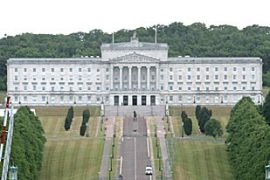Justice vote carried in NI assembly
Northern Ireland’s politicians back return of police and justice powers to Belfast.

‘Powerful message’
The British, Irish and US governments had long pressed for the assembly to pass the measure in line with the intentions of the Good Friday accord of 1998 which helped bring peace to the territory.
The two key coalition parties, the Democratic Unionists and Sinn Fein, negotiated the pact last month during nearly two weeks of day-and-night negotiations.
But it required majority approval from both sides of the assembly to become law.
A total of 88 members of Northern Ireland’s assembly supported the move, with 17 voting against.
Gordon Brown, the British prime minister, said the vote as confirmed the wisdom of “devolving” powers from the UK to local politicians.
“It sends the most powerful message to those who would return to violence: that democracy and tolerance will prevail,” he said.
“The courage and leadership of the parties who voted to complete devolution at Stormont [the site of the assembly] will be noted around the world.”
Unionist opposition
Reg Empey, leader of the UUP, said that Northern’s Ireland’s nearly three-year-old coalition had failed to exercise its existing powers responsibly and that his party therefore had no choice but to vote “no” to the measure.
Empey specified how the two sides of Northern Ireland’s government could not even agree on how to reform high school entrance examinations despite years of deadlock on the issue.
He also questioned whether Sinn Fein and the Democratic Unionists could “stand together when the inevitable challenge from these dissident [armed groups opposing the peace process] elements comes”.
“The stark fact is the leaders of the parties in the executive have not had a single conversation together about how we will respond to the dissident threat,” said Empey.
Addressing Empey’s view, Peter Robinson, the Democratic Unionist leader, who also leads the coalition government, said: “Northern Ireland doesn’t need leaders who are timid, or who dither and dally.”
Bush intervention
On Friday, George Bush, the former US president, telephoned David Cameron, leader of Britain’s opposition Conservative Party, to seek his help in persuading the UUP to vote in favour of the measure.
But Cameron said on Tuesday that, despite his party’s electoral alliance with the Ulster Unionists, he could not tell them how to vote.
The move clears the way for Britain on April 12 to transfer control of the territory’s police and justice system to local hands for the first time since 1972, the worst year of Northern Ireland bloodshed.
Sinn Fein has agreed to give the top justice department post to David Ford, who leads Northern Ireland’s Alliance Party.
It is the only party that tries to attract votes equally from both sides of the community and, consequently, receives few votes from either.